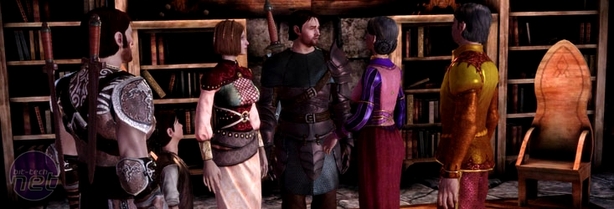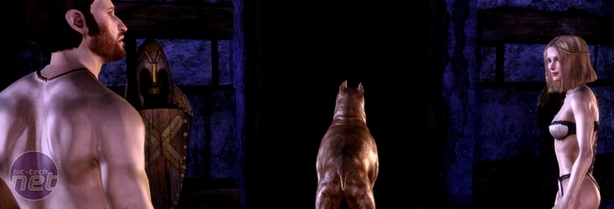
Gameplay
Where Dragon Age starts clawing back some of our appreciation is when it gets down to the mechanics of the gameplay – the way the skills are layered on each other and the variety of skills. And the origins system, which is worth a lot more than you might suspect when it comes to establishing a properly developed persona to play as.The origins system is quite simply an opening to the game which is customised to your chosen race and class combo. You might start off as an inner city elf, who lives in a slum district and is oppressed by human masters, or as a human noble who is forced to flee his home city after a terrible betrayal.
Whatever the setting, the origins system is a brilliant way of extending the replayability of the game and giving the tutorial stage of the game a deeper flavour. Playing as a dwarven peasant who is hated by everyone around him goes a long way to embittering you against other races, while the wild elf story gives you a sense of cruel entitlement that puts your hatred in a different light. Either way, you’d be surprised how deeply it can affect your play style and it’s to Bioware’s credit that the origins are so successful in generating this effect.
Unfortunately though, for all the attention that’s been lavished on this innovative feature, its main flaw is that there just isn’t enough of them and the actual race/class combos at your disposal are astonishingly limited compared to other Bioware RPGs – though that’s not particularly surprising. The options for customising your character have got progressively less with each new Bioware game. In Dragon Age you only have six options – Human, Dwarf, Elf and Rogue, Warrior, Wizard. Not all of them are compatible either, while the origins narrow things down further. There’s only one Wizard origin story, for example and it’s the same for all races.
Things get a lot better once you permeate through into the meat of the game though as it’s here that you’re able to take a greater degree of control about how your character progresses in terms of both stats and style. Stat-wise the progression system is pretty similar to the one used in Star Wars: Knights of The Old Republic, with a selection of different skill paths open to players depending on their class choices. It does have a few differences though in that you’re also raising your base statisitics (Strength, Dexterity, etc) as well as exploring the skill trees every time you level up.
Like Mass Effect, Dragon Age also introduces a sub-class choice once you’ve progressed deep enough into the game that specialisations become more important. While it’s definitely somewhat annoying that it isn’t presented earlier on to give you more control, it’s probably a good thing that you don’t end up specialising before you’ve had a chance to settle on a play style – especially as the character creator can involve a lot of back and forth.
In terms of the type of personas possible in Dragon Age, Bioware have again followed on from the choice made in Mass Effect by forcing you to be on the side of good but allowing you to choose your methods. Thus, you can’t really decide to go on and turn to the side of evil – but you can piss off plenty of people in your pursuit of justice.
Dragon Age: Origins eschews Mass Effect’s Renegade and Paragon ratings however and instead allows important NPCs to judge you based on their approval scales. The same system essentially existed in Baldur’s Gate obviously, but now it’s been bought to the surface and allowed to play a larger part in how the characters develop. It’s arguably undermined by the fact that conversations are relayed as full dialogue choices (rather than Mass Effect’s emotion conversation system) and the incredibly simplistic gift system that seems paradoxically out of place, but it’s also fantastic for expanding the personalities of your team-mates.
That’s one place where Bioware has characteristically delivered with standard brilliance by the way – when it comes to the roster of characters you can recruit into your party. There are so slightly suspect choices when it comes to attire and background (especially with the shawl-wearing Morgan), but for the most part the characters in Dragon Age are well rounded and believably flawed which, for a game like this where you’re always pursuing some agenda whether overt or covert, is a critical success.

MSI MPG Velox 100R Chassis Review
October 14 2021 | 15:04











Want to comment? Please log in.